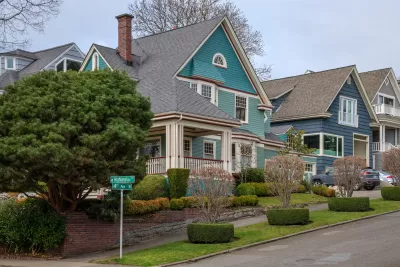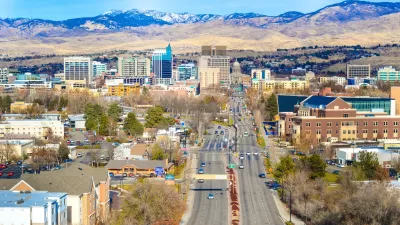Form-based zoning codes can encourage mixed-use development and walkable neighborhoods, but focusing too much on aesthetic elements can drive up the cost of housing.

Writing in The Urbanist, Ryan DiRaimo explains form-based codes, which Seattle is exploring as part of the city’s effort to reform its zoning code.
According to DiRaimo, “The great thing about a form-based code is that it allows things like coffee shops, bookstores, corner stores, and small retail to mix in with the neighborhoods previously zoned exclusively for residential. With a form-based code’s flexibility for land-use, we can finally have vibrant, walkable neighborhoods again.”
However, DiRaimo warns, “where a form-based code fails is when it is used to mandate aesthetic details that have little impact on improving the quality of the public realm—the very purpose of form-based code’s existence.” Pointing to a recently passed state bill, DiRaimo writes that regulating design and aesthetics too much can be “overly prescriptive” and discourage creativity in design.
“With the clock running out on Seattle’s planning process, there is a deep concern that form-based code adoption will include prescriptive design regulations because it’s an established element of the code according to a consultant who has already completed a template.” For DiRaimo, “The eclectic mix of different styles of buildings is what makes Seattle neighborhoods interesting and desirable,” and reviewing every small aesthetic detail won’t improve affordability.
“We need fewer rules and better processes,” DiRaimo concludes. “And since housing is almost never a charity, the aesthetic rules will only kill building plans, limit housing supply, and segregate who can afford to move into the neighborhood.”
FULL STORY: Op-Ed: Off-Base Form-Based Codes Could Be Headed to Seattle

Planetizen Federal Action Tracker
A weekly monitor of how Trump’s orders and actions are impacting planners and planning in America.

DARTSpace Platform Streamlines Dallas TOD Application Process
The Dallas transit agency hopes a shorter permitting timeline will boost transit-oriented development around rail stations.

Congressman Proposes Bill to Rename DC Metro “Trump Train”
The Make Autorail Great Again Act would withhold federal funding to the system until the Washington Metropolitan Area Transit Authority (WMATA), rebrands as the Washington Metropolitan Authority for Greater Access (WMAGA).

Supreme Court Ruling in Pipeline Case Guts Federal Environmental Law
The decision limits the scope of a federal law that mandates extensive environmental impact reviews of energy, infrastructure, and transportation projects.

Texas State Bills to Defund Dallas Transit Die
DART would have seen a 30% service cut, $230M annual losses had the bills survived.

Bikeshare for the Win: Team Pedals to London Cricket Match, Beats Rivals Stuck in Traffic
While their opponents sat in gridlock, England's national cricket team hopped Lime bikes, riding to a 3-0 victory.
Urban Design for Planners 1: Software Tools
This six-course series explores essential urban design concepts using open source software and equips planners with the tools they need to participate fully in the urban design process.
Planning for Universal Design
Learn the tools for implementing Universal Design in planning regulations.
Roanoke Valley-Alleghany Regional Commission
City of Mt Shasta
City of Camden Redevelopment Agency
City of Astoria
Transportation Research & Education Center (TREC) at Portland State University
US High Speed Rail Association
City of Camden Redevelopment Agency
Municipality of Princeton (NJ)





























